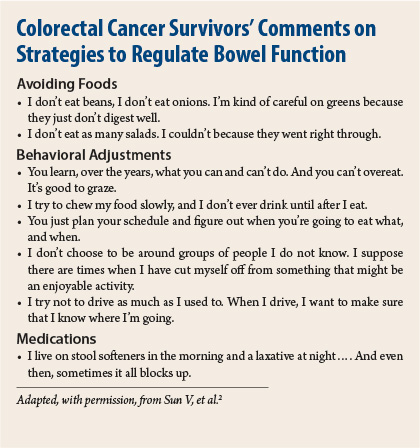The fight against colorectal cancer leaves many survivors with battle wounds, according to studies that show a high incidence of assorted morbidities that can affect quality of life. Clinicians, in fact, may be unaware of the struggles with bowel function that occur during survivorship, researchers said at the 2014 Gastrointestinal Cancers Symposium in San Francisco.
A study from the University of Pennsylvania, Philadelphia, described patient-reported outcomes for 657 colorectal cancer survivors who answered questions regarding late effects of treatment. The participants used a publically available Internet-based tool for the creation of survivorship care plans (www.livestrongcareplan.com).
Altered Bowel Patterns
The late effects of treatment—which involved surgery for 97%, chemotherapy for 89%, and radiation for 37%—included chronic changes in bowel patterns (63%), chronic diarrhea (38%), bowel obstruction (9%), hernia development (18%), radiation colitis (8%), and fistula formation (2%).
Of 249 survivors who graded their gastrointestinal toxicity, 23% reported having four to six stools per day, and 18% reported having more than six stools or incontinence, according to James M. Metz, MD, Professor of Radiation Oncology at the Hospital of the University of Pennsylvania, Philadelphia.
Queries about sexual function revealed that 35% of men had worse erectile function than before treatment, and 42% of women reported sexual changes such as vaginal dryness.
The participants found the survivorship plan beneficial, stating that it improved their knowledge of late treatment effects (90%) and their knowledge of which tests and treatments are needed during the survivorship period (83%).
“The data reported here may have a significant impact on future studies of quality of life, as well as on patient counseling and survivor care,” Dr. Metz said.
Dietary and Behavioral Adjustments
Loss of bowel control results in persistent problems, with difficulty controlling gas, fecal incontinence, and incomplete bowel evacuation. While patients must learn to manage these effects of treatment, little has been learned about how patients accomplish that. Researchers from the University of Arizona, City of Hope, and Kaiser Permanente Northwest and Northern California, therefore, studied the dietary and behavioral adjustments that long-term colorectal cancer survivors must make to regulate their bowel function.
The study presented by Virginia Sun, RN, PhD, Assistant Professor, Nursing Research and Education, at City of Hope, Duarte, California, used a mixed-methods analysis of survey, focus group, and interview data from four studies that assessed health-related quality of life. The population involved 919 patients from three Veterans Affairs (VA) Centers and three Kaiser Permanente (KP) regions diagnosed with colorectal cancer at least 5 years earlier and who were living with ostomies or anastamoses.
“Many survivors in both samples reported making dietary adjustments following surgery, and many never became comfortable with their diet,” Dr. Sun reported.
Survivors in both the VA and KP samples who reported decreases in health-related quality of life made the most dietary adjustments and were more likely to report that they had never become comfortable with these alterations.
The key adjustments included the following:
Of all patients surveyed, 40% to 46% said they had adjusted their diet because of ostomy or surgery.
Overall, 28% to 43% had made dietary adjustments within the first 12 months of treatment; the fewest adjustments were made by VA patients with ostomies and the most were observed within the VA sample with anastomosis.
Only about 11% of patients had never needed to make dietary adjustments.
50% of patients with lower quality-of-life scores (< 7) reported making dietary adjustments, compared to 35% to 41% of patients with better scores (≥ 7).
“Most dietary and behavioral adjustments were made to counter their negative effects on bowel function,” Dr. Sun said.
The comments related to the patients’ strategies for bowel function regulation were interesting (see sidebar below). From these, the researchers developed a framework that illustrates the strategies that survivors used for regulating bowel function and coping with bowel dysfunction.
“Colorectal cancer survivors use a multitude of adaptive strategies to control their bowel function. Many struggle with unpredictable bowel function continually for the rest of their lives, and many never find any set of management strategies to achieve regularity,” she said.
Better understanding of the adjustments these individuals find to be necessary should inspire evidence-based recommendations, she suggested. n
Disclosure: Dr. Metz has received research funding from the LiveSTRONG Foundation. Dr. Sun reported no potential conflicts of interest. For full disclosures of the study authors, visit meetinglibrary.asco.org. ■
References
1. Metz JM, et al: Updated patient reported outcomes and survivorship care plan use by survivors of colorectal cancer. 2014 Gastrointestinal Cancers Symposium. Abstract 527. Presented January 18, 2014.
2. Sun V, et al: Dietary and behavioral adjustments to control bowel function by long-term colorectal cancer survivors. 2014 Gastrointestinal Cancers Symposium. Abstract 573. Presented January 18, 2014.




